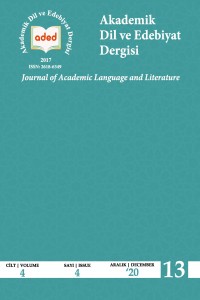Research Article
Year 2020,
Volume: 4 Issue: 4, 1038 - 1050, 30.12.2020
Abstract
Leylâ Erbil started her literary journey with Tuhaf Bir Kadın (1971), and ended this adventure with Tuhaf Bir Erkek (2013). Among others, her other novels Karanlığın Günü, Mektup Aşkları, Cüce, Üç Başlı Ejderha and Kalan stand in a distinct place in the history of literature with their handling of issues. These seven texts, which are mostly evaluated in feminist literature, can also be analized with other phenomenons such as “being human, self consciousness, self-existence, and being oneself”. It can also be seen that there is a thematically spiral structure in these seven texts which can be taken into the same bracket of “oddness”. One may claim that the texts are born from each other, talk to each other, from beginning to end they are almost parts of a single novel and gathered in one center. In this center, people who are trying to be an individual, trying to create an identity, and struggling with society and all other institutions cannot be ultimately belong to any specific place as in the words of Zenîme Hanım of Cüce, they are just "an identity without any belonging". In this study, it will be determined how Neslihan's "identity without belonging" is shaped in Karanlığın Günü. Based on Foucault's term “Technologies of the self", it will be emphasized that Neslihan's self is shaped in writing and authorship, and it will be seen that she finally defines herself without belongingness with the effect of narcissistic damage caused by her inability to reach a full text because of the troubles of her daily life.
References
- Brun, Anne (2017). Narsisizm ve Yaratıcılık. (Yay. Haz.: Nilüfer Erdem). İstanbul: Yapı Kredi Yay.
- Deleuze, Gilles (2006). Müzakereler. (Çev. İnci Uysal). İstanbul: Norgunk.
- Erbil, Leylâ (2013). Zihin Kuşları. İstanbul: Türkiye İş Bankası Kültür Yay.
- Erbil, Leylâ (2018). Karanlığın Günü. İstanbul: Türkiye İş Bankası Kültür Yay.
- Erdem, Nilüfer (2017). Narsisizm ve Yaratıcılık. (Yay. Haz.: Nilüfer Erdem). İstanbul: Yapı Kredi Yay.
- Foucault, Michel (2000). Özne ve İktidar. İstanbul: Ayrıntı Yay.
- Gürbilek, Nurdan (2010). Kör Ayna, Kayıp Şark. İstanbul: Metis Yay.
- Habip, Bella (2017). Narsisizm ve Yaratıcılık. (Yay. Haz.: Nilüfer Erdem). İstanbul: Yapı Kredi Yay.
- Kohut, Heinz (2017). Kendiliğin Yeniden Yapılanması. İstanbul: Metis Yay.
- Leylâ Erbil’de Etik ve Estetik (2007). (Yay. Haz.: Süha Oğuzertem) İstanbul: Kanat Kitap.
- Şahin, Burcu (2019). “Leylâ Erbil”. Türk Edebiyatı İsimler Sözlüğü. http://teis.yesevi.edu.tr/madde-detay/erbil-leyla
Year 2020,
Volume: 4 Issue: 4, 1038 - 1050, 30.12.2020
Abstract
Tuhaf Bir Kadın (1971) adlı metniyle yazın parantezini açan Leylâ Erbil, Tuhaf Bir Erkek (2013) ile parantezi kapatmıştır. Bu parantezin içindeki Karanlığın Günü, Mektup Aşkları, Cüce, Üç Başlı Ejderha ve Kalan adlı romanları meseleleri ele alış biçimiyle edebiyat tarihinde ayrıksı bir yerde durmaktadır. Daha çok feminist yazın içinde değerlendirilen bu yedi metin, elbette insan oluş, “kendilik bilinci”, “kendiiçinvarlık”, “kendi olma” vb. farklı meseleler merkeze alınarak da incelenebilir. Tuhaflık parantezindeki yedi metinde tematik açıdan sarmal bir yapının olduğu görülmektedir. Metinlerin birbirinden doğduğu, birbiriyle konuştuğu, baştan sonra neredeyse tek bir romanın bölümleri olduğu ve bir merkezde toplandığı iddia edilebilir. Bu merkezde birey olmaya, kimlik oluşturmaya çalışan, bunun mücadelesini toplumla ve her türden kurumla çatışarak veren kişilerin nihayetinde hiçbir yere tam mânâsıyla ait olamamaları, Cüce metnindeki Zenîme Hanım’ın ifadesiyle birer “aitsiz kimlik” oluşları anlatılır. Bu çalışmada Karanlığın Günü romanının “aitsiz kimlik”i Neslihan’ın kendilik sorunsalında nasıl biçimlendiği belirlenecektir. Foucault’nun “kendini biçimlendirme teknolojileri” teriminden hareketle Neslihan’ın kendiliğinin yazıda ve yazarlıkta şekillendiği üzerinde durulacak, gündelik hayatın sıkıntılarıyla tam bir metne ulaşamamasının yarattığı narsisistik zedelenmenin de etkisiyle en nihayetinde kendini aitsiz oluşla tanımladığı görülecektir.
Keywords
References
- Brun, Anne (2017). Narsisizm ve Yaratıcılık. (Yay. Haz.: Nilüfer Erdem). İstanbul: Yapı Kredi Yay.
- Deleuze, Gilles (2006). Müzakereler. (Çev. İnci Uysal). İstanbul: Norgunk.
- Erbil, Leylâ (2013). Zihin Kuşları. İstanbul: Türkiye İş Bankası Kültür Yay.
- Erbil, Leylâ (2018). Karanlığın Günü. İstanbul: Türkiye İş Bankası Kültür Yay.
- Erdem, Nilüfer (2017). Narsisizm ve Yaratıcılık. (Yay. Haz.: Nilüfer Erdem). İstanbul: Yapı Kredi Yay.
- Foucault, Michel (2000). Özne ve İktidar. İstanbul: Ayrıntı Yay.
- Gürbilek, Nurdan (2010). Kör Ayna, Kayıp Şark. İstanbul: Metis Yay.
- Habip, Bella (2017). Narsisizm ve Yaratıcılık. (Yay. Haz.: Nilüfer Erdem). İstanbul: Yapı Kredi Yay.
- Kohut, Heinz (2017). Kendiliğin Yeniden Yapılanması. İstanbul: Metis Yay.
- Leylâ Erbil’de Etik ve Estetik (2007). (Yay. Haz.: Süha Oğuzertem) İstanbul: Kanat Kitap.
- Şahin, Burcu (2019). “Leylâ Erbil”. Türk Edebiyatı İsimler Sözlüğü. http://teis.yesevi.edu.tr/madde-detay/erbil-leyla
There are 11 citations in total.
Details
| Primary Language | Turkish |
|---|---|
| Subjects | Literary Studies |
| Journal Section | Articles |
| Authors | |
| Publication Date | December 30, 2020 |
| Submission Date | November 9, 2020 |
| Acceptance Date | November 21, 2020 |
| Published in Issue | Year 2020 Volume: 4 Issue: 4 |

